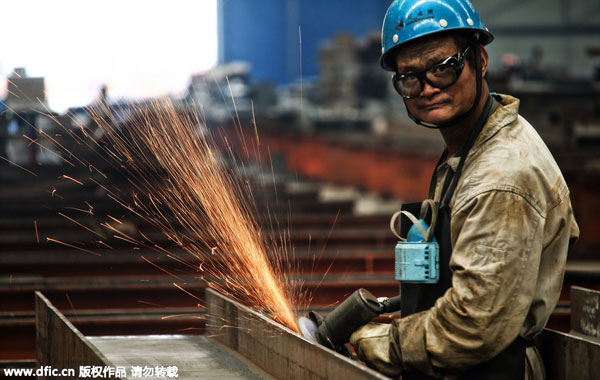 |
|
A worker processes steel products at a factory in Nantong city, Jiangsu province, June 8, 2014. [Photo/IC] |
Key China growth engines sputtered in July after a short-lived recovery in the second quarter, casting a shadow on its overall economic outlook for the coming months, according to the latest official data.
Industrial output, the main monthly measure of growth, expanded 6 percent in July from a year ago, down from 6.8 percent in June and ending a upward streak since March, the National Bureau of Statistics said on Wednesday.
Growth in fixed-asset investments excluding rural households edged down from 11.4 percent in the first six months to 11.2 percent in the first seven months, the slowest pace since 2000.
The NBS does not provide single month data.
"A marked deceleration in China's industrial output in July shows the tentative stabilization that started in the second quarter has come to a premature end," said Bloomberg economists Fielding Chen and Tom Orlik in a statement.
"A stumbling factory sector underlines why China has moved to support export competitiveness with a depreciation of the yuan, and now argues for further steps to underpin growth in the months ahead."
The disappointing data are likely to add downward pressure on the value of the currency, which has become more market-driven, analysts said.
The data came after previous data showing deepening factory-gate deflation and a fall in exports in July.
Jiang Yuan, an analyst with the NBS, attributed the sharp slowdown in industrial output partly to declining exports. Exports fell by 8.3 percent over a year ago in dollar terms.
Weakening investment and property demand is another reason, he said.
Output of crude steel and cement often seen as proxies for the property investment sector, contracted 4.6 percent and 4.7 percent over a year ago, respectively, while electricity output contracted 2 percent.
The downturn is even affecting sales of air conditioners.
Despite a spate of price cuts by producers and retailers, sales in the first six months fell 6.6 percent over a year ago, according to AVC, a national electronic appliance sale data provider. Retail sales growth in July decelerated to 10.5 percent, according to the NBS.
Based on the latest data, Bloomberg now estimates China's monthly GDP growth will be 6.6 percent year-on-year in July, down from 6.9 percent in June, a first slowdown since February.
Real estate investment in July slid to 4.3 percent year-on-year, remaining a drag on overall GDP growth. But the slowdown is narrowing, while investment in the residential sector rose 3 percent, up from 2.8 percent in June, the first acceleration since 2014.
The ongoing warm-up in home sales is driving the recovery in real estate investment. July residential sales actually dropped from a high base in June, but compared with the same period a year ago, they have surged 25.5 percent in floor-space terms and 40 percent in value, according to China Daily calculations based on the new NBS data.
Jeffery Gao, head of Nomura's China property research section, said the current outlook for the country's property market is good, as investment slowed and new housing starts declined at double-digit pace (17.9 percent contraction in July), meaning housing inventories are steadily declining.
